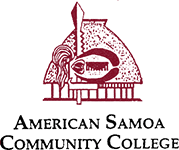American Samoa Community College MOODLE
15 Week Session
ART 150 is a survey course, which focuses on the Art forms created during the major historical periods in time from the Paleolithic to the Late Gothic periods. The course is a survey of artworks that help to define different civilizations during these periods and are presented in lecture format with imagery. (Note: 3 lecture credits)
- Teacher: Ruth Tauiliili-Mahuka
ART 160 is an introductory studio course that covers the Elements and Principles in Art. Students are tested on the basic concepts of these rudiments and are required to create different works of art that exemplify them. (Note: 1.5 lecture credits, 1.5 studio credits)
- Teacher: Regina Meredith
ART 161 is a studio course that introduces the art forms of Samoa and the Pacific. The art forms include woodcarving, Siapo (Bark Cloth Painting), weaving, pottery, and the tattoo. Local master craftsmen share in their expertise with students and an art project is required for each art form. Students are required to develop a book of notes that reflect the different art forms, and exhibit choice works in the annual art exhibition. (Note: 1.5 lecture credits, 1.5 studio credits)
- Teacher: Regina Meredith
A survey of theatre from the Greeks to the present. This course is designed to acquaint students with the various historical periods through lecture demonstration and in class performance. (Note: 3 lecture credits)
- Teacher: Kuki Tuiasosopo
The course examines the principles of interpretive reading. Textual analysis, training in individual and group performance techniques, including voice and articulation are studied, as well as development, arrangement and performance of program. (Note: 3 lecture credits)
- Teacher: Kuki Tuiasosopo
Music Fundamentals is designed to introduce basic concepts in the organization of music as an expressive medium. The primary focus of the course is to introduce students with little or no musical background to the notation of musical ideas both in reading and writing music. The elements of music including rhythm, melody, meter, pitch, form and expression will be explored through singing, playing classroom instruments, listening, and composition. The roles of the composer, performer, and listener are explored. (Note: 3 lecture credits)
- Teacher: Loretta Puaauli
This course offers a survey of the masterpieces of classical music in sound, including elements, style, history and forms from 1300 to the present. Emphasis placed on appreciating and understanding music as art. (Note: 3 lecture credits)
- Teacher: Loretta Puaauli
Students will engage in a comprehensive survey of the traditional and popular music of the world’s cultures. Special emphasis placed on understanding the relationships among music, politics, religion and culture. (Note: 3 lecture credits)
- Teacher: Loretta Puaauli
A large singing organization open to all students, the choir will work on voice development and note reading and will perform music from various periods. Concert participation is required. (Note: 1 lecture credit; May be repeated for a maximum of three (3) credits.)
- Teacher: Loretta Puaauli
The techniques of organizing and delivering a wide variety of speeches. Major course work consists of reading about speech, wording, preparation and presentation of student speeches. (Note: 3 lecture credits)
- Teacher: Kuki Tuiasosopo
